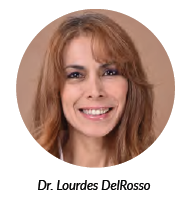From hormone to over-the-counter supplement.
Dr. Lourdes DelRosso is passionate about helping people find good rest. She has a particular interest in restless sleep and restless legs syndrome. Along with her work in sleep medicine, Dr. DelRosso has often been asked to discuss melatonin and its role in helping provide healthier sleep.

According to Dr. DelRosso, melatonin is a natural component of our circadian regulation—circadian referring to our natural inner clock or cycle of sleep and wake. “Melatonin is a hormone produced in the pineal gland under conditions of darkness, such as in the evening,” Dr. DelRosso explains. “The production of melatonin is blocked by light exposure during daytime.”
Dr. DelRosso explains that there are two main things that regulate our sleep circadian timing. “One is melatonin and one is light exposure,” she states. “When our circadian clock does not match our social sleep requirements such in situations of jet lag, we can use melatonin and light to adjust to the new time. Similarly, we sometimes have a ‘delayed sleep cycle’ and a low dose of melatonin can help regulate or set up the new time.”
There is sensible caution against using high doses of melatonin. What constitutes a high dose is debatable, but perhaps more than 3 mg/night. In a sleep clinic setting, patients may be treated with higher doses for specific sleep conditions, under MD supervision. Unfortunately, sometimes self-administration doses exceed 20-30 mg.
Melatonin has become a buzzword–especially for parents desperate to help their child find much-needed rest. But Dr. DelRosso cautions that there is a time and place for introducing this particular therapy into a child’s sleep regimen and to do so with help from your physician or pediatrician. “Our bodies naturally produce melatonin when its dark,” she details. “The circadian rhythm is designed in a way that light signals our brain that it is daytime, and so melatonin is not produced. However, in the absence of light, our sleep clock (the suprachiasmatic nucleus) knows that it is time to sleep, and melatonin starts being produced.”
Before introducing melatonin, Dr. DelRosso suggests establishing a regular sleep schedule first:
• Start dimming the lights 1-2 hours before bedtime.
• Have a relaxed bedtime routine.
• Keep the bedroom cool and dark.
• Avoid caffeine for at least six hours before bedtime, remembering that chocolate and iced tea can have caffeine also.
• Do not engage in vigorous activity close to bedtime.
• Turn off all electronics and keep them out of the bedroom.
If, after establishing a solid routine, you or your child fail to find relief for difficulties with sleep, a doctor should be consulted. There are several different sleep disorders that affect sleep and can mimic insomnia including restless legs syndrome, obstructive sleep apnea and behavioral insomnia in childhood. “It is very important to diagnose sleep disorders early to avoid consequences. Also, there may be other reasons affecting sleep including medical conditions, depression or anxiety, social issues or environmental problems,” she goes on to explain. “And the physician can help identify and address these issues.”
Dr. DelRosso says that the fact that melatonin is not regulated by the U.S. Food and Drug Administration and is simply sold over-the-counter as a “supplement” causes her great concern. She explains that this means the doses may vary or other substances may be used during preparation. “In fact, a research article on melatonin preparations published in the Journal of Clinical Sleep Medicine showed that the melatonin content in the products analyzed varied significantly from -83% to +478%! Other substances not reported to be in the preparation included serotonin, present in 8 out of 30 preparations in this study.” Melatonin can be made from hormone secretions of animals or microorganisms, but more often are made with synthetic melatonin.
Currently, there is not very much research in the field of melatonin. “We definitely need more research studying the long-term consequences of melatonin,” she says. Side effects, however, are not usually prevalent, with nightmares and headaches being the chief complaints that Dr. DelRosso has seen in her office. It is also unlikely you will become dependent on melatonin or have a diminished response after repeated use. Aging adults will naturally create less melatonin.
Children can also use this supplement. Dr. DelRosso often recommends melatonin for short-term use in children. She specifically notes that children with autism spectrum disorder can benefit from melatonin. Dr. DelRosso states, “Recently published guidelines from the American Academy of Neurology recommend physicians to offer melatonin if behavioral strategies are not helpful.” Other sleep disorders are also prevalent in children and it is very important to consult with your pediatrician or sleep physician before starting using melatonin.
……………………………………………….
Lourdes DelRosso is a sleep physician at Seattle Children’s Hospital and Associate Professor in the department of Pediatrics at the University of Washington School of Medicine. Originally from Peru, she earned her medical degree at the University of Miami and then went on to complete a residency in Family Medicine at Kaiser Permanente/UC Irvine, a Sleep Medicine fellowship at Louisiana State University and a Masters in Medical Education at the University of Pennsylvania.
……………………………………………….
Wendi Kitsteiner is a former high school English and Journalism teacher who has worked as a writer/editor for the RLS Foundation and as an editorial assistant for a cardiovascular researcher at Mayo Clinic. She is currently homeschooling her four children on a farm in East Tennessee.



